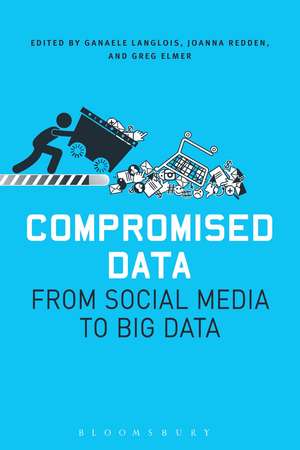Compromised Data: From Social Media to Big Data
Editat de Dr. Greg Elmer, Dr. Ganaele Langlois, Dr. Joanna Reddenen Limba Engleză Hardback – 9 sep 2015
| Toate formatele și edițiile | Preț | Express |
|---|---|---|
| Paperback (1) | 195.85 lei 43-57 zile | |
| Bloomsbury Publishing – 9 sep 2015 | 195.85 lei 43-57 zile | |
| Hardback (1) | 832.99 lei 43-57 zile | |
| Bloomsbury Publishing – 9 sep 2015 | 832.99 lei 43-57 zile |
Preț: 832.99 lei
Preț vechi: 1067.08 lei
-22% Nou
Puncte Express: 1249
Preț estimativ în valută:
159.39€ • 166.86$ • 131.89£
159.39€ • 166.86$ • 131.89£
Carte tipărită la comandă
Livrare economică 07-21 aprilie
Preluare comenzi: 021 569.72.76
Specificații
ISBN-13: 9781501306501
ISBN-10: 1501306502
Pagini: 296
Ilustrații: black & white illustrations
Dimensiuni: 152 x 229 x 18 mm
Greutate: 0.56 kg
Editura: Bloomsbury Publishing
Colecția Bloomsbury Academic
Locul publicării:New York, United States
ISBN-10: 1501306502
Pagini: 296
Ilustrații: black & white illustrations
Dimensiuni: 152 x 229 x 18 mm
Greutate: 0.56 kg
Editura: Bloomsbury Publishing
Colecția Bloomsbury Academic
Locul publicării:New York, United States
Caracteristici
Adopts a truly global approach, covering issues relating to how social media are used in a variety of cultures and countries
Notă biografică
Ganaele Langlois is Assistant Professor at York University, Canada, and Associate Director of the Infoscape Centre for the Study of Social Media, Toronto Metropolitan University, Canada. Her research focuses on new media theory, software studies and technoculture. Joanna Redden is Assistant Professor of Critical Media Studies at the University of Calgary, Canada. Her work investigates how digital technologies influence political, media, and protest practices specifically as related to poverty, inequality, and governance.Greg Elmer is Bell Globemedia Research Chair and Director of the Infoscape Centre for the Study of Social Media at Toronto Metropolitan University, Canada. His research and teaching focus on new media and politics, theories and methods in social media studies, surveillance theory, and media globalization.
Cuprins
Notes on ContributorsIntroduction Ganaele Langlois, York University; Joanna Redden, University of Calgary and Greg Elmer, Toronto Metropolitan University, CanadaPart 1: Data, Power and PoliticsBig Data as System of Knowledge: Investigating Canadian GovernanceJoanna Redden, University of Calgary, CanadaData Mining Research and the Disintegration of Society: the "Project X" Haren RiotsIngrid M. Hoofd, National University of Singapore, SingaporeLook at the Man Behind the Curtain: Computational Management in "Spontaneous" Citizen Political CampaigningDavid Karpf, George Washington University, USAPart 2: Data Limit(ed)Easy Data, Hard Data: The politics and pragmatics of Twitter research after the computational turn Jean Burgess and Axel Bruns, Queensland University of Technology, Australia Scraping the First PersonGreg Elmer, Toronto Metropolitan University, CanadaOpen Data and its Enemies? Digital Methods and Compromised DataFenwick McKelvey, Concordia University, CanadaCritical Reverse Engineering: The Case of Twitter and TalkOpenRobert Gehl, University of Utah, USAPart 3. Alt-DataMapping Movements - Social Movement Research and Big Data: Critiques and AlternativesSky Croeser and Tim Highfield, Curtin University, AustraliaData Activism Alessandra Renzi, Northeastern University, USA, and Ganaele Langlois, York University, CanadaA Contribution to the Political Economy of Personal ArchivesYuk Hui, Leuphana University, GermanyThe Haunted Life of Data Lisa Blackman, Goldsmiths University, UKIndex
Recenzii
Big data promise a more efficient understanding of citizen needs, wants, and desires and cast a wide net of harnessing these tendencies in the hope of bringing about more direct forms of democracy. At the same time, however, they do so at the cost of compromising personal data, in effect sacrificing the personal for the political. Compromised Data features contributions from leading scholars who examine the immediacy and complexity of data, big or small, and is a must read for all interested in these issues.
Social theorists and champions of civil rights have long been concerned with the politics and practices of dataveillance, forms of surveillance accomplished through computation instead of by visual inspection. Yet, Compromised Data may be the first book that is so very clear about the threats and dangers of surveillance after the computational turn; after when, that is, the concern is not so much who sees whom, but whose data is captured by whom and what calculations are performed on that data. You have been instrumented -- through all your Internet-enabled devices -- to divulge where you are and when, what you say and write, with whom you associate, and what you are interested in. This book asks in very specific terms how we are compromised by big data.
[CC] The digital age provides society with many advantages in the areas of communication and information on a personal, social, or political level. Here, more then ten international scholars who have examined the importance and complexity of social data and big data issues address the dangers that may occur in surveillance of online sites, including how and by whom this social data may be transformed and eventually controlled. Under the best scenario, data collection and analysis help society further the common good. However, the results of social data analysis can often be compromised. Avenues such as Facebook and Twitter allow users to share personal information, but often these sites are compromised by marketers who may use this information for profit. Clicking on a link frequently gives researchers worthwhile information, but even an innocuous click can be problematic. In addition, privacy is a major issue. Individuals innocently list information about their age, where they work and live, what their interests and concerns are, where they travel, etc., not realizing the potential adverse effects of their actions. Selected information from data collected online can lead to issues related to social profiling and guilt or innocence, as well as flag persons of interest. Overall, a thought-provoking book for all online users. Summing Up: Recommended. All readership levels.
Social theorists and champions of civil rights have long been concerned with the politics and practices of dataveillance, forms of surveillance accomplished through computation instead of by visual inspection. Yet, Compromised Data may be the first book that is so very clear about the threats and dangers of surveillance after the computational turn; after when, that is, the concern is not so much who sees whom, but whose data is captured by whom and what calculations are performed on that data. You have been instrumented -- through all your Internet-enabled devices -- to divulge where you are and when, what you say and write, with whom you associate, and what you are interested in. This book asks in very specific terms how we are compromised by big data.
[CC] The digital age provides society with many advantages in the areas of communication and information on a personal, social, or political level. Here, more then ten international scholars who have examined the importance and complexity of social data and big data issues address the dangers that may occur in surveillance of online sites, including how and by whom this social data may be transformed and eventually controlled. Under the best scenario, data collection and analysis help society further the common good. However, the results of social data analysis can often be compromised. Avenues such as Facebook and Twitter allow users to share personal information, but often these sites are compromised by marketers who may use this information for profit. Clicking on a link frequently gives researchers worthwhile information, but even an innocuous click can be problematic. In addition, privacy is a major issue. Individuals innocently list information about their age, where they work and live, what their interests and concerns are, where they travel, etc., not realizing the potential adverse effects of their actions. Selected information from data collected online can lead to issues related to social profiling and guilt or innocence, as well as flag persons of interest. Overall, a thought-provoking book for all online users. Summing Up: Recommended. All readership levels.













